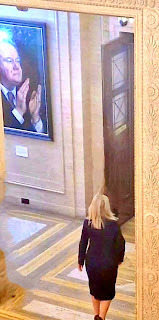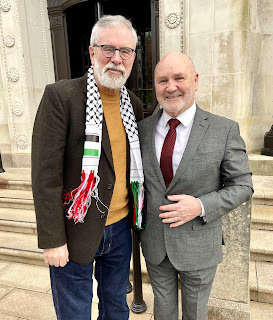Something fundamental has happened: Alex Maskey: Ivor Browne

Somethingfundamental has happened.
The restoration lastSaturday of the political institutions and the election of Michelle O'Neill asFirst Minister marks an extraordinary turning point in the process ofconstitutional change for the North and for the island of Ireland. It is asignificant new chapter in the transitional process of change that began withthe peace process. Last Saturday something fundamental happened.
In its century ofexistence the northern statelet reflected the ethos and wishes of those whoruled us. It was born out of colonialism, occupation, conflict, sectariandivision, fear and partition. Under successive unionist and British regimes itrelied for its survival on special powers, structured inequality anddiscrimination. Up to this point the northern state has had 11 unionist PrimeMinisters and First Ministers and a succession of largely mediocre BritishSecretaries of State who saw their role as shoring up unionism and defendingpartition and the union. Last Saturday that changed. A Republican is now FirstMinister. Structures foisted on us to block this from ever happening havecrumbled.
In 1998 the GoodFriday Agreement began the challenging process of unravelling all of this. Itprovided for a level playing field on which all of the political parties canpresent their analysis; promote their policies; and advocate for theirobjectives – Irish Unity or Union with Britain – while requiring that theyaccept the outcome of the democratic process.
On the core issues ofIrish Unity or the Union the Agreement recognised that it is for the people “ofthe island of Ireland alone, by agreement between the two parts respectivelyand without external impediment, to exercise their right of self-determinationon the basis of consent, freely and concurrently given, North and South, tobring about a united Ireland, if that is their wish, accepting that this rightmust be achieved and exercised with and subject to the agreement and consent ofa majority of the people of Northern Ireland.”
The Agreement alsoprovides for referendums North and South and if in the future, the people votefor Irish Unity there is a “binding obligation on both Governments to introduceand support in their respective Parliaments legislation to give effect to thatwish.”
Of course, Britishgovernments are not renowned for honouring commitments. Last week, followinghis deal with the DUP, British Secretary of State Chris Heaton-Harris claimedthat any change on the North’s place in the union “would absolutely depend onthe consent of both communities.” Not true. Any change will depend on ademocratic majority in a referendum voting for unity.
That places asignificant onus on republicans who want maximum constitutional change and anew Ireland – united and independent - to engage positively with those who donot share our vision of the future or with those who are unsure what thatfuture should look like.
Michelle O’Neill willcarry out her duties and responsibilities honestly and with diligence. As FirstMinister she will advocate for every citizen, and for every family irrespectiveof their attitude to the Union or Irish Unity. She will defend the right ofevery citizen, of every family, to choose their preferred future. But as acommitted Irish Republican activist and leader she will also work to advancethe objective of Irish Unity. These are not contradictory positions. They arecomplementary.
Michelle’s speech tothe Assembly is evidence of this. It was a confident, well deliveredwide-ranging manifesto for change for the future. It spoke of the need todeliver “for all our people, for every community” and to make “life better forworkers, families, communities.”
Michelle acknowledgedthat the new Executive will “face great challenges” and it will. Not leastbecause of the stranglehold British governments – Tory and Labour - have overthe North. Among these she identified the rising cost of living, patientswaiting for treatment and support, workers on the picket lines, the need forchildcare supports, social and affordable housing, key infrastructuredevelopment projects, the climate crisis and Lough Neagh, and using the WindsorFramework to advance the all-Ireland economy. She identified the epidemic ofviolence against women and girls and said she would prioritise a new strategyto tackle this.
She expressed hersorrow for all the lives lost during the conflict. And she committed herself tothe work of reconciliation.
Michelle spoke for allof us who have watched in horror the Israeli government’s genocide against the Palestinianpeople when she called for an immediate ceasefire. For dialogue and peace.
Last Saturday was agood day. Everyone who made a stand over the decades or in more recent timesshould be proud of the progress we have made. Inevitably there will be manychallenges. The Tories in London are not our friends. And the Executive is acoalition of parties with widely different opinions. But with good will andrespect we can make it work.
Before the business ofelecting the Ministers my friend and comrade for many years Alex Maskey finallygot the opportunity to step back from the Ceann Chomhairle’s office.
Four years ago yearsAlex was elected Speaker and he did that job intelligently, fairly andpatiently. His time was up in 2022 but because the Assembly was suspended Alexcontinued to play that role for the last two years.
He took a number ofvery worthy initiatives even though the Assembly was suspended. They included A Youth Assembly made up of ninety young people aged fromthirteen to eighteen. He also convened A Women's Parliament and an Assembly forCitizens with Disabilities.
He met foreigndelegations and hosted others interested in the Good Friday Agreement and thepeace process. Last year he was front and centre in Parliament Buildings forthe 25th celebration of the Good Friday Agreement.
The respect and esteemin which he is held was evident at the weekend in the unanimous words of praiseand thanks he received from all sides of the Assembly.
It was a far cry fromAlex’s first entry into elected politics in 1983. In June that year he was SinnFéin’s first Belfast City Councillor. He ran a gauntlet of abuse fromunionists. They refused to talk to him. They tried to shout him down, soundedhorns, blew rape whistles, threatened him. He was the target of constantharassment by the British Army and RUC and the victim of several assassinationattempts by unionist death squads, including one in which his friend Alan Lundywas shot and killed in Alex’s home and another in which Alex was gravelywounded. Undaunted by all of this Alex went on to become the first ever SinnFéin Mayor.
Alex has committedhimself to continuing his activism and to the goal of Irish Unity and to theprinciples and objectives he has dedicated his life to. So, well done Alex andwell done also to Liz, an activist in her own right. She has been by his sidethrough all of these years. Ádh mor oraibh a chairde.
Ivor Browne
Ivor Browne died lastweek, aged ninety four. I admired him a lot. And I’m glad to say I met him afew times. He was one of the world’s leading and pioneering psychiatrists. AsPresident Micheal D Higgins said he ‘…left a profound mark on the understandingand attitudes to mental health in Ireland’. A visionary and a doer Ivordismantled mental institutions and developed community clinics. He was arevolutionary. Professor Brendan Kelly said his legacy was ‘the additionalliberty enjoyed by thousands of people who avoided institutionalisation as aresult of the reforms which Ivor came to represent’.
He spoke up on behalfof the political prisoners, especially the Armagh Women Political Prisoners.Speaking out in 1985 against strip searching he said: “Strip searching is arather violent procedure and tremendous intrusion on a human being . . . InIreland clothes are almost a part of a person’s body. To invade this is aviolation. It is a violent act, and I think, in this sense rapacious.”
Ivor was also amusician and a co founder in 1959, with Garech Browne, of Claddagh Records, torecord Irish traditional music, song and poetry. Claddagh is stillthriving and wonderful elements of our rich heritage is preserved thanks totheir vision.
Ivor was also SNQ -sound on the national question. He did great work in Derry in the 1970s andafterwards by assisting the development of community models forhuman development. My condolences to Ivor’s family. His life was a lifewell lived.
Gerry Adams's Blog
- Gerry Adams's profile
- 29 followers




